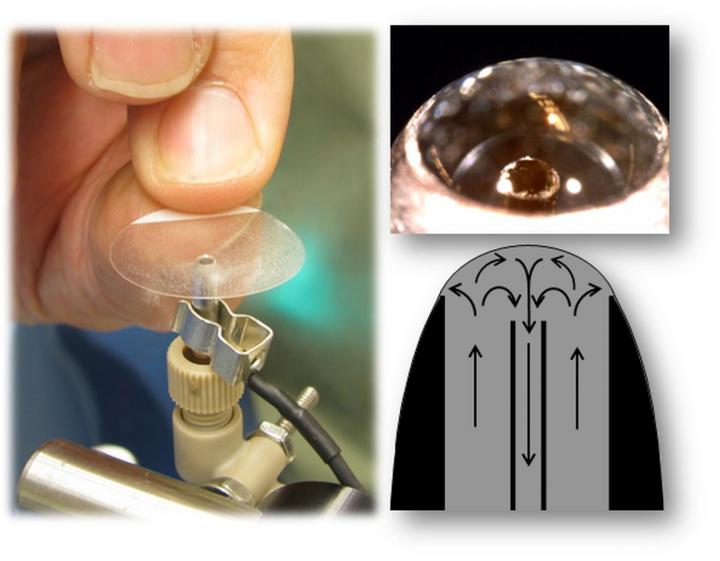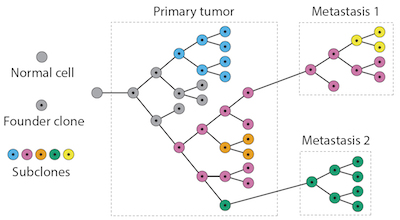 The problem is that hospitals are big and getting bigger, going from building to buildings to campuses. They are expensive and getting more expensive. At some point, we have to ask: is this really how we want to spend our healthcare dollar? Some hospitals are figuring other ways to spend their -- I mean, "our" -- money on our health. Take Nationwide Children's Hospital. Located in a somewhat blighted neighborhood of Columbus (OH), its Healthy Neighborhoods Healthy Families (HNHF) program "treats the neighborhood as the patient," as their summary in Pediatrics put it. The hospital is leading a partnership that has built 58 affordable housing units, renovated 71 homes, given out 158 home improvement projects, and helped spur a 58 unit housing/office development. They've also hired 800 local residents and instituted a jobs training program.
The problem is that hospitals are big and getting bigger, going from building to buildings to campuses. They are expensive and getting more expensive. At some point, we have to ask: is this really how we want to spend our healthcare dollar? Some hospitals are figuring other ways to spend their -- I mean, "our" -- money on our health. Take Nationwide Children's Hospital. Located in a somewhat blighted neighborhood of Columbus (OH), its Healthy Neighborhoods Healthy Families (HNHF) program "treats the neighborhood as the patient," as their summary in Pediatrics put it. The hospital is leading a partnership that has built 58 affordable housing units, renovated 71 homes, given out 158 home improvement projects, and helped spur a 58 unit housing/office development. They've also hired 800 local residents and instituted a jobs training program.
University of Pennsylvania
See the following -
First, We Tear Down All the Hospitals
- Login to post comments
For $149 a Month, the Doctor Will See You as Often as You Want
Forward’s rethinking of the doctor’s office includes lots of touch screens, white walls, and wood accents. Imagine if your doctor’s office was more like an Apple Store mashed up with a fancy gym: a modern white-and-wood aesthetic, replete with fancy gadgets and gleaming touch screens, for which you paid a monthly fee to visit as often as you wished. That’s the environment I stepped into last week upon entering the new medical clinic belonging to San Francisco health startup Forward, which opened to the public on Tuesday in the city’s Financial District...
- Login to post comments
How Machine Learning May Revolutionize Medicine
 Doctors will one day be able to more accurately predict how long patients with fatal diseases will live. Medical systems will learn how to save money by skipping expensive and unnecessary tests. Radiologists will be replaced by computer algorithms. These are just some of the realities patients and doctors should prepare for as “machine learning” enters the world of medicine, according to Dr. Ziad Obermeyer, an assistant professor at Harvard Medical School, and Dr. Ezekiel Emanuel of the University of Pennsylvania, who recently coauthored an article in the New England Journal of Medicine on the topic...
Doctors will one day be able to more accurately predict how long patients with fatal diseases will live. Medical systems will learn how to save money by skipping expensive and unnecessary tests. Radiologists will be replaced by computer algorithms. These are just some of the realities patients and doctors should prepare for as “machine learning” enters the world of medicine, according to Dr. Ziad Obermeyer, an assistant professor at Harvard Medical School, and Dr. Ezekiel Emanuel of the University of Pennsylvania, who recently coauthored an article in the New England Journal of Medicine on the topic...
- Login to post comments
How open source software is fighting COVID-19
 Since the end of January, the [open source] community has contributed to thousands of open source repositories that mention coronavirus or COVID-19. These repositories consist of datasets, models, visualizations, web and mobile applications, and more, and the majority are written in JavaScript and Python. Previously, we shared information about several open hardware makers helping to stop the spread and suffering caused by the coronavirus. Here, we're sharing four (of many) examples of how the open source software community is responding to coronavirus and COVID-19, with the goal of celebrating the creators and the overall impact the open source community is making on the world right now.
Since the end of January, the [open source] community has contributed to thousands of open source repositories that mention coronavirus or COVID-19. These repositories consist of datasets, models, visualizations, web and mobile applications, and more, and the majority are written in JavaScript and Python. Previously, we shared information about several open hardware makers helping to stop the spread and suffering caused by the coronavirus. Here, we're sharing four (of many) examples of how the open source software community is responding to coronavirus and COVID-19, with the goal of celebrating the creators and the overall impact the open source community is making on the world right now.
- Login to post comments
On The Positive Effect of Collaboration and Information Sharing Among Physicians
 For better and for worse, our healthcare system is built around physicians. For the most part, they’re the ones we rely on for diagnoses, for prescribing medications, and for delivering care. And, often, simply for being a comfort. Unfortunately, in 2023, they’re still “only” human, and they’re not perfect. Despite best intentions, they sometimes miss things, make mistakes, or order ineffective or outdated care. The order of magnitude for these mistakes is not clear; one recent study estimated 800,000 Americans suffering permanent disability or death annually. Whatever the real number, we’d all agree it is too high. Many, myself included, have high hopes that appropriate use of artificial intelligence (AI) might be able to help with this problem. Two new studies offer some considerations for what it might take.
For better and for worse, our healthcare system is built around physicians. For the most part, they’re the ones we rely on for diagnoses, for prescribing medications, and for delivering care. And, often, simply for being a comfort. Unfortunately, in 2023, they’re still “only” human, and they’re not perfect. Despite best intentions, they sometimes miss things, make mistakes, or order ineffective or outdated care. The order of magnitude for these mistakes is not clear; one recent study estimated 800,000 Americans suffering permanent disability or death annually. Whatever the real number, we’d all agree it is too high. Many, myself included, have high hopes that appropriate use of artificial intelligence (AI) might be able to help with this problem. Two new studies offer some considerations for what it might take.
- Login to post comments
Open Source Oak Ridge Graph Analytics for Medical Innovation Receives R&D 100 Award
 Researchers at the Department of Energy's Oak Ridge National Laboratory have received seven R&D 100 Awards in recognition of their significant advancements in science and technology. The honorees were recognized on Nov. 3 at the 54th annual R&D 100 Conference, sponsored by R&D Magazine. The awards, known as the "Oscars of Invention," honor innovative breakthroughs in materials science, biomedicine, consumer products and more from academia, industry and government-sponsored research agencies. This year's seven honors bring ORNL's total of R&D 100 awards to 200 since their inception in 1963...
Researchers at the Department of Energy's Oak Ridge National Laboratory have received seven R&D 100 Awards in recognition of their significant advancements in science and technology. The honorees were recognized on Nov. 3 at the 54th annual R&D 100 Conference, sponsored by R&D Magazine. The awards, known as the "Oscars of Invention," honor innovative breakthroughs in materials science, biomedicine, consumer products and more from academia, industry and government-sponsored research agencies. This year's seven honors bring ORNL's total of R&D 100 awards to 200 since their inception in 1963...
- Login to post comments
Open Source Penn Software Helps to Identify Course of Cancer Metastasis, Tumor "Evolution"
 Researchers have come to realize that cancer is a disease driven by the same “survival of the fitter” forces that Darwin proposed drove the evolution of life on Earth. In the case of tumors, however, individual cells are constantly evolving as a tumor’s stage advances. Mobile cancer cells causing metastasis are a deadly outcome of this process. Tumors also differ among patients with the same type of cancer, so how is a physician able to prescribe a tailored regimen for the patient? To start to address this conundrum, an interdisciplinary team from the Perelman School of Medicine and the Wharton School at the University of Pennsylvania developed Canopy...
Researchers have come to realize that cancer is a disease driven by the same “survival of the fitter” forces that Darwin proposed drove the evolution of life on Earth. In the case of tumors, however, individual cells are constantly evolving as a tumor’s stage advances. Mobile cancer cells causing metastasis are a deadly outcome of this process. Tumors also differ among patients with the same type of cancer, so how is a physician able to prescribe a tailored regimen for the patient? To start to address this conundrum, an interdisciplinary team from the Perelman School of Medicine and the Wharton School at the University of Pennsylvania developed Canopy...
- Login to post comments
Parker Foundation Invests $250 Million in Open and Collaborative Cancer Research to Accelerate Innovation
 The Parker Foundation today announced a $250 million grant to launch the Parker Institute for Cancer Immunotherapy, a collaboration between many of the country's best scientists, clinicians and industry partners to lead an unprecedented cancer immunotherapy research effort. The gift is the largest single contribution ever made to the field of immunotherapy. The Parker Institute's goal is to accelerate the development of breakthrough immune therapies capable of turning cancer into a curable disease by ensuring the coordination and collaboration of the field's top researchers and quickly translating their findings into patient treatments.
The Parker Foundation today announced a $250 million grant to launch the Parker Institute for Cancer Immunotherapy, a collaboration between many of the country's best scientists, clinicians and industry partners to lead an unprecedented cancer immunotherapy research effort. The gift is the largest single contribution ever made to the field of immunotherapy. The Parker Institute's goal is to accelerate the development of breakthrough immune therapies capable of turning cancer into a curable disease by ensuring the coordination and collaboration of the field's top researchers and quickly translating their findings into patient treatments.
- Login to post comments
Penn Research Study on Massive Open Online Courses (MOOCs)
A new study, published last week by University of Pennsylvania researchers in the journal Nature, shows that students who have taken Massive Open Online Courses (MOOC) on Coursera are highly educated and career-oriented. In addition to being well-educated, the students who enrolled also tend to be young, male and employed. About 44% of all students surveyed said they had made the decision to sign up in order to gain specific skills to do their job better. Read More »
- Login to post comments
Penn Research Team Receives $5 Million Grant to Use Big Data to Improve Health
 A team of physicians and researchers across Penn Medicine and the University of Pennsylvania have been awarded a four-year $5 million grant to develop and test algorithms aimed at predicting adverse health events in real time. The project, Smarter Big Data for a Healthy Pennsylvania: Changing the Paradigm of Healthcare, is funded by the Commonwealth Universal Research Enhancement (CURE) program, and will examine the use of the algorithms in the hospital, at home, and in the community...
A team of physicians and researchers across Penn Medicine and the University of Pennsylvania have been awarded a four-year $5 million grant to develop and test algorithms aimed at predicting adverse health events in real time. The project, Smarter Big Data for a Healthy Pennsylvania: Changing the Paradigm of Healthcare, is funded by the Commonwealth Universal Research Enhancement (CURE) program, and will examine the use of the algorithms in the hospital, at home, and in the community...
- Login to post comments
Researchers Develop Low-cost, Portable Laboratory on a Phone for Faster Infection Testing in Low Resource Settings
 Washington State University researchers have developed a low-cost, portable laboratory on a phone that works nearly as well as clinical laboratories to detect common viral and bacterial infections. The work could lead to faster and lower-cost lab results for fast-moving viral and bacterial epidemics, especially in rural or lower-resource regions where laboratory equipment and medical personnel are sometimes not readily available.
Washington State University researchers have developed a low-cost, portable laboratory on a phone that works nearly as well as clinical laboratories to detect common viral and bacterial infections. The work could lead to faster and lower-cost lab results for fast-moving viral and bacterial epidemics, especially in rural or lower-resource regions where laboratory equipment and medical personnel are sometimes not readily available.
- Login to post comments
We Are Going to Need Bigger Post-ITs if We Want Design Thinking in Healthcare
 When it comes to healthcare, we certainly have a lot of things that are big, and probably the only reason more aren't red has to do with that color-of-blood/code red thing. But when it comes to design that one would really call good...not so much. In NEJM Catalyst, Amy Compton-Phillips and Namita Seth Mohta reported on their Care Redesign Survey, which surveyed the NEJM Catalyst Insights Council. The survey found that there was strong support for design thinking (90%+), and was seen as valuable for a wide range of health care issues. Yet less than a quarter use design thinking regularly. When asked to list the top three barriers to applying design thinking to healthcare problems, respondents said:
When it comes to healthcare, we certainly have a lot of things that are big, and probably the only reason more aren't red has to do with that color-of-blood/code red thing. But when it comes to design that one would really call good...not so much. In NEJM Catalyst, Amy Compton-Phillips and Namita Seth Mohta reported on their Care Redesign Survey, which surveyed the NEJM Catalyst Insights Council. The survey found that there was strong support for design thinking (90%+), and was seen as valuable for a wide range of health care issues. Yet less than a quarter use design thinking regularly. When asked to list the top three barriers to applying design thinking to healthcare problems, respondents said:
- Login to post comments
ECRI Institute’s 19th Annual Conference To Explore “Systemness” Within Healthcare Delivery
ECRI Institute’s 19th Annual Conference on the Use of Evidence in Policy and Practice, Creating “Systemness” within Healthcare Delivery: Can Success be Proven and Shared?, brings together 40 nationally recognized experts to discuss how to determine which elements of more mature healthcare systems result in the best clinical outcomes, and whether those successes can be transferred to smaller, newer, or less integrated systems. The free public service conference will be held November 28-29, 2012, in Washington, DC, at the National Transportation Safety Board (NTSB) Conference Center at L’Enfant Plaza; advance registration is required as space is limited.
Read More »
- Login to post comments